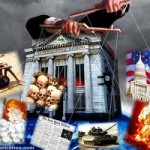North Dakota is the very definition of a red state. It voted 58 percent to 39 percent for Romney over Obama, and its statehouse and senate have a total of 104 Republicans and only 47 Democrats. The Republican super-majority is so conservative it recently passed the nation’s most severe anti-abortion resolution – a measure that declares a fertilized human egg has the same right to life as a fully formed person.
But North Dakota is also red in another sense: it fully supports its state-owned Bank of North Dakota (BND), a socialist relic that exists nowhere else in America. Why is financial socialism still alive in North Dakota? Why haven’t the North Dakotan free-market crusaders slain it dead?
Because it works.
In 1919, the Non-Partisan League, a vibrant populist organization, won a majority in the legislature and voted the bank into existence. The goal was to free North Dakota farmers from impoverishing debt dependence on the big banks in the Twin Cities, Chicago and New York. More than 90 years later, this state-owned bank is thriving as it helps the state’s community banks, businesses, consumers and students obtain loans at reasonable rates. It also delivers a handsome profit to its owners—the 700,000 residents of North Dakota. In 2011, the BND provided more than $70 million to the state’s coffers. Extrapolate that profit-per-person to a big state like California and you’re looking at an extra $3.8 billion a year in state revenues that could be used to fund education and infrastructure.
One of America’s Best Kept Secrets
Each time we pay our state and local taxes—and all manner of fees—the state deposits those revenues in a bank. If you’re in any state but North Dakota, nearly all of these deposits end up in Wall Street’s too-big to-fail banks, because those banks are the only entities large enough to handle the load. The vast majority of the nation’s 7,000 community banks are too small to provide the array of cash management services that state and local governments require. We’re talking big bucks; at least $1 trillion of our local tax dollars find their way to Wall Street banks, according to Marc Armstrong, executive director of the Public Banking Institute.
So, not only are we, as taxpayers, on the hook for too-big-to-fail Wall Street banks, but we also end up giving our tax dollars to these same banks each and every time we pay a sales tax or property tax or buy a fishing license. In North Dakota, however, all that public revenue runs through its public state bank, which in turn reinvests in the state’s small businesses and public infrastructure via partnerships with 80 small community banks.
How the State Bank Creates Jobs
Banks are supposed to serve as intermediaries that turn our savings and checking deposits into productive loans to businesses and consumers. That’s how jobs are supported and created. But the BND, a state agency, goes one step further. Through its Partnership in Assisting Community Expansion, for example, it provides loans at below-market interest rates to businesses if and only if those businesses create at least one job for every $100,000 loaned. If the $1 trillion that now flows to Wall Street instead were deposited in public state banks in all 50 states using this same approach, up to 10 million new jobs could be created. That would effectively end our destructive unemployment crisis.
No Bailouts for the BND
Banking doesn’t have to be a casino. It doesn’t have to be designed to create gambling opportunities so bank traders and executives can make seven- and eight-figure salaries. As BND president Eric Hardmeyer said in a 2009 Mother Jones interview:
We’re a fairly conservative lot up here in the upper Midwest and we didn’t do any subprime lending and we have the ability to get into the derivatives markets and put on swaps and callers and caps and credit default swaps and just chose not to do it, really chose a Warren Buffett mentality—if we don’t understand it, we’re not going to jump into it. And so we’ve avoided all those pitfalls.
As state government employees, BND executives have no incentive to gamble their way toward enormous pay packages. As you can see, the top six BND officers earn a good living, but on Wall Street, cooks and chauffeurs earn more.
• Eric Hardmeyer, President and CEO: $232,500
• Bob Humann, Chief Lending Officer: $135,133
• Tim Porter, Chief Administrative Officer: $122,533
• Joe Herslip, Chief Business Officer: $105,000
• Lori Leingang, Chief Administrative Officer: $105,000
• Wally Erhardt, Director of Student Loans of North Dakota: $91,725
The very existence of a successful BND undermines Wall Street’s claim that in order to attract the best talent big banks need to offer enormous pay packages. Yet somehow, North Dakota is able to find the talent to run one of the soundest banks in the country? The BND is living proof that Wall Street’s rationale for sky-high executive pay is a self-serving fabrication.
Wall Street Is Gunning for Bank of North Dakota
As you can well imagine, our financial elites would love to see this successful (socialist!) bank disappear. Its salary structure and local investments makes a mockery of Wall Street’s casino banking system. But the bigger threat comes from the possible spread of this public banking concept to other states. Already, there are 20 or so state legislatures that are exploring state banks. Collectively, more public banks would pose an enormous threat to the $1 trillion in state and local bank deposits that now run through Wall Street.
But elite financiers also stand to lose much more. In the 49 states without a public bank, there’s no safe place to turn for loans to rebuild schools and finance other public infrastructure projects. That creates an enormous opportunity for Wall Street firms to hook localities on expensive bond programs—like capital appreciation bonds, which can lead to repayments equaling 10 times the original loan. Investment bankers and advisers also make enormous fees by selling expensive, high-risk financial schemes to state and local governments (read an investigative report here). But such schemes are useless in North Dakota where the state bank provides the capital the state needs for a fraction of the long-term costs.
Trade Agreements: Wall Street’s Weapon of Mass Destruction
Clearly, from Wall Street’s perspective, the North Dakota bank must go, and all other state efforts to replicate it must be thwarted. Wall Street’s stealth weapon may be lodged within the latest corporate trade agreement called the Trans-Pacific Partnership (TPP), which currently is being negotiated in secret. We already know that Wall Street is seeking to remove all tariff restrictions that prevent the U.S. financial services industry from doing business in countries like Brunei, Chile, Malaysia, Mexico, New Zealand, Peru, Singapore and Vietnam. The biggest banks also want the treaty to eliminate “non-tariff” barriers including regulations that create “unfair” competition with state-owned financial enterprises.
Depending on the final language, it is possible that the activities of the Bank of North Dakota could be ruled illegal because “foreign bankers could claim the BND stops them from lending to commercial banks throughout the state,” according to an analysis by Sam Knight in Truthout. How perfect for Wall Street: a foreign bank can be used as a shill to knock out the BND.
The Public Bank Movement
A small but highly dedicated group of financial writers, public finance experts and former bankers have formed the Public Bank Institute to spread the word. Working on a shoestring budget, its president Ellen Brown (author of Web of Debt), and its executive director Marc Armstrong have become the Johnny Appleseeds of public banking, hopping from state to state to encourage legislatures to explore state-owned banks.
The movement is gathering steam as it holds a major conference on June 2-4 at Dominican University in San Rafael, CA featuring such anti-Wall Street hell raisers as Matt Taibbi and Gar Alperowitz, along with Brigitte Jonsdottir, a member of the Icelandic parliament, and Ellen Brown.
Is America Up For This Fight?
Since the crash, the financial community has largely managed to wriggle off the hook. In fact, fatalism may be replacing activism as we sense that maybe Wall Street is simply too big and too powerful to change. After all, the big banks seem to own Washington, as too-big-to-fail banks are permitted to grow even larger and more invulnerable to prosecution and control.
But this new public banking movement could have legs, especially if it teams up with those fighting for a financial transaction tax (see National Nurses United.) Most Americans remain furious about how financial elites profited from the crisis—before, during and after—while the rest of us pick up the tab. Americans know deep down that Wall Street is the predator and we are the prey.
The state-owned and operated Bank of North Dakota proves that it doesn’t have to be that way. This is the time to fight for public state banking in a big way.
– To the original… ➡

